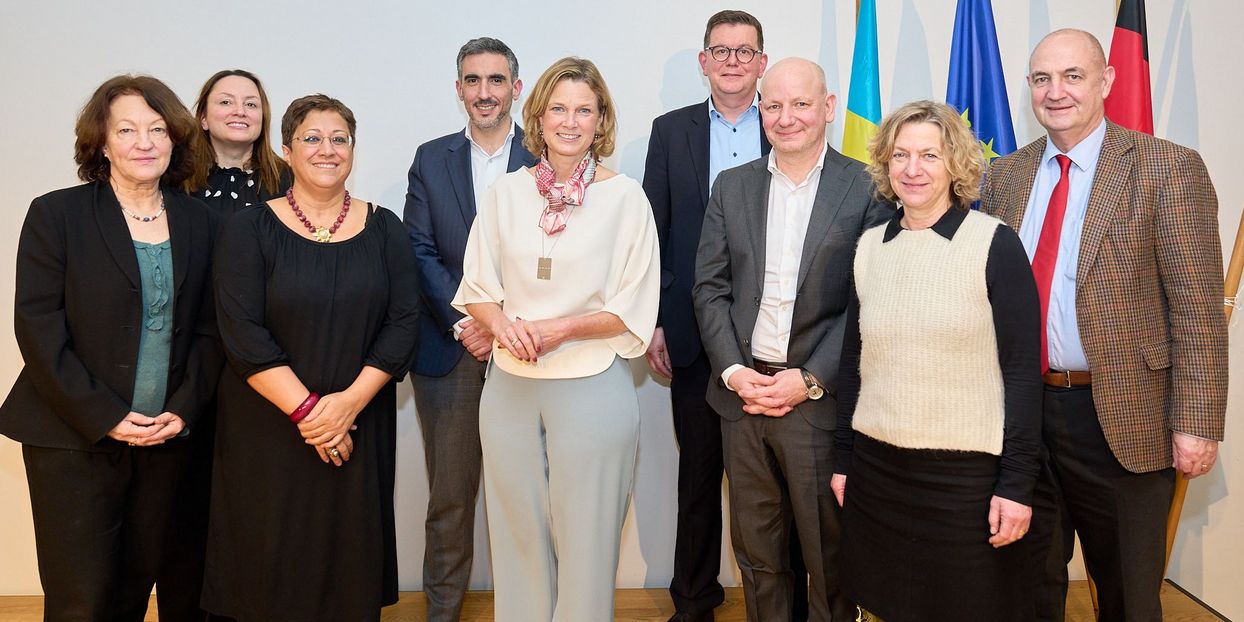
The ageless scourge of antisemitism and the protection of Jewish life in Europe – What can we do?
Crisis Talk on 5 March 2024
The Leibniz Research Network "Environmental Crises – Crisis Environments", the Research Centre "Normative Orders" and the Hessian State Representation in Brussels in cooperation with the RADIS knowledge transfer project "Social Causes and Effects of Radical Islam in Germany and Europe" invited to the event on "The ageless scourge of antisemitism and the protection of Jewish life in Europe – What can we do?". Further information on the transfer project RADIS, funded by the German Federal Ministry of Education and Research can be found here.
In his welcoming address, Claus-Peter Appel, Deputy Head of the State Representation of Hessen to the EU, addressed the topicality of antisemitism following the Hamas attacks on Israel on October 7, 2023. He pointed out that antisemitism is still deeply rooted in society, which is underlined by the rise in antisemitic crimes in Germany and Europe. Appel emphasized the urgency of vigorously pursuing the discussion about Jewish life and our fundamental values.
In her welcoming address, Rebecca Schmidt, Managing Director of the Normative Orders Research Center at Goethe University Frankfurt, emphasized the importance of dialogue between academia and politics in tackling the complex challenges of our time, such as antiemitism.
In her keynote speech, Prof. Dr. Stefanie Schüler-Springorum, Director of the Centre for Research on Antisemitism at the Technical University of Berlin and Coordinator of the Research Network on Antisemitism in the 21st Century FoNA21, emphasized the essential role of the state and the police in protecting Jewish life. She pointed out that antisemitism is often seen as a simplistic response to complex problems and emphasized that a clear distinction between legitimate criticism of Israeli policy and antisemitic and antizionist attitudes is of great importance.
As concrete measures, she suggested that Jewish communities need protection on two levels: On the one hand vertically, through state measures, and on the other hand horizontally, through increased engagement by civil society. She particularly emphasized the importance of Jewish-Muslim alliances as an essential element in building solidarity. Schüler-Springorum emphasized the need to learn from history and to see the defense of democratic values as the cornerstone for the protection of Jewish life in a diverse society.
In the subsequent panel discussion, moderated by Michael Thaidigsmann, Prof. Dr. Oliver Decker, Director of the Else-Frenkel-Brunswik Institute for Democracy Research at the University of Leipzig, explained the findings of the Leipzig Authoritarianism Study. The study has been researching the extent of extreme right-wing attitudes within society since 2002, with a focus on analyzing authoritarian dynamics and antisemitism, among other things, since 2018. Decker emphasized that antisemitism is no longer a problem of the fringes, but is deeply rooted in the middle of society. He explained that antisemitism and the tendency to express it covertly were already on the rise before October 7, both in Germany and globally.
When asked how the European Commission defines antisemitism, especially in the context of criticism of Israel, Katharina von Schnurbein, EU Commissioner for Combating Antisemitism and Promoting Jewish Life, explained that the Commission has adopted the definition of the International Holocaust Remembrance Alliance (IHRA) since 2017. This definition emphasizes the importance of context and the need to examine each statement carefully. She highlighted that the European Commission has developed strategies and programs to encourage Member States to implement their own measures. Twenty Member States have already taken action, either by developing their own strategies against antisemitism or by integrating such initiatives into their national strategies against racism and discrimination.
Yohan Benizri, board member of the World Jewish Congress, specifically addressed the challenges of dealing with antisemitism in Belgium following the events of October 7. He criticized the widespread ignorance and political challenges that make it difficult to combat antisemitism and pointed out that despite the recognition of the IHRA definition by the Belgian Senate in 2018, a comprehensive strategy against antisemitism was lacking.
The panel discussion was rounded off by numerous and stimulating questions from the audience, which underlined the relevance of the topic. The lunch debate brought together around 130 people from various (political) institutions in Brussels.
The event was funded by the generous support of the German Federal Ministry of Education and Research.
Welcome
Claus-Peter Appel
Deputy Head of the Representation of the State of Hessen to the European Union
Rebecca C. Schmidt
Research Center Normative Orders – Goethe University
Keynote
Prof Dr Stefanie Schüler-Springorum
Director of the Centre for Research on Antisemitism in Berlin,
Coordinator of the Research Network on Antisemitism in the 21st Century, FoNA21
Panel discussion
Prof Dr Stefanie Schüler-Springorum
Katharina von Schnurbein
European Commission Coordinator on combating antisemitism and fostering Jewish life
Yohan Benizri
World Jewish Congress Executive Board Member
Prof Dr Oliver Decker
Director of the Else Frenkel Brunswik Institute for Democracy Research at Leipzig University
Moderated by
Michael Thaidigsmann
Jüdische Allgemeine

![Claus-Peter Appel ©Hessische Landesvertretung/Bruno Maes [Translate to english:] Claus-Peter Appel spricht Begrüßungsworte zum 28. Crisis Talk.](/fileadmin/_processed_/9/c/csm_05.03.24_HES__31_ee48e052c3.jpg)
![Rebecca C. Schmidt ©Hessische Landesvertretung/Bruno Maes [Translate to english:] Rebecca C. Schmidt begrüßt zum 28. Crisis Talk.](/fileadmin/_processed_/5/c/csm_05.03.24_HES__41_7b0375b21c.jpg)
![Prof. Dr. Stefanie Schüler-Springorum ©Hessische Landesvertretung/Bruno Maes [Translate to english:] Prof. Dr. Stefanie Schüler-Springorum hält einen Impulsvortrag zur Einfühung in das Thema der Veranstaltung.](/fileadmin/_processed_/9/8/csm_05.03.24_HES__49_478afd892b.jpg)
![28. Crisis Talk ©Hessische Landesvertretung/Bruno Maes [Translate to english:] Blick ins Publikum auf die ca. 130 Gäste der Veranstaltung.](/fileadmin/_processed_/9/4/csm_05.03.24_HES__55_80779d410a.jpg)
![Michael Thaidigsmann ©Hessische Landesvertretung/Bruno Maes [Translate to english:] Der Moderator Michael Thaidigsmann stellt die Gäste des Panels vor.](/fileadmin/_processed_/5/d/csm_05.03.24_HES__56_050919c8bd.jpg)
![Katharina von Schnurbein ©Hessische Landesvertretung/Bruno Maes [Translate to english:] Katharina von Schnurbein spricht auf dem Panel.](/fileadmin/_processed_/8/a/csm_05.03.24_HES__89_b03cf97bac.jpg)
![Katharina von Schnurbein und Prof. Dr. Oliver Decker ©Hessische Landesvertretung/Bruno Maes [Translate to english:] Auf dem Foto sind Katharina von Schnurbein und Prof. Dr. Oliver Decker auf dem Panel zu sehen.](/fileadmin/_processed_/3/5/csm_05.03.24_HES__109_e03a1f6e3f.jpg)
![28. Crisis Talk ©Hessische Landesvertretung/Bruno Maes [Translate to english:] Blick aus dem Zuschauerraum auf die Bühne mit den Diskutant*innen.](/fileadmin/_processed_/b/d/csm_05.03.24_HES__98_7bfc484536.jpg)
![Yohan Benizri ©Hessische Landesvertretung/Bruno Maes [Translate to english:] Yohan Benizri spricht auf dem Panel.](/fileadmin/_processed_/d/6/csm_05.03.24_HES__95_1e0370ac82.jpg)
![Prof. Dr. Stefanie Schüler-Springorum und Yohan Benizri ©Hessische Landesvertretung/Bruno Maes [Translate to english:] Auf dem Bild zu sehen sind Prof. Dr. Stefanie Springorum und Yohan Benizri während der Paneldiskussion.](/fileadmin/_processed_/2/7/csm_05.03.24_HES__74_6df9ac3cea.jpg)
![Gäste beim 28. Crisis Talk ©Hessische Landesvertretung/Bruno Maes [Translate to english:] Das Bild zeigt die Unterhaltung der Veranstaltungsgäste.](/fileadmin/_processed_/8/e/csm_05.03.24_HES__115_38e59a5b73.jpg)
![Gäste beim 28. Crisis Talk ©Hessische Landesvertretung/Bruno Maes [Translate to english:] Das Bild zeigt die Unterhaltung der Veranstaltungsgäste.](/fileadmin/_processed_/5/a/csm_05.03.24_HES__18_24d5c05fa4.jpg)
![Gäste beim 28. Crisis Talk ©Hessische Landesvertretung/Bruno Maes [Translate to english:] Das Bild zeigt die Unterhaltung der Veranstaltungsgäste.](/fileadmin/_processed_/7/4/csm_05.03.24_HES__16_6ea8faf1cf.jpg)
![Gäste beim 28. Crisis Talk ©Hessische Landesvertretung/Bruno Maes [Translate to english:] Das Bild zeigt die Unterhaltung der Veranstaltungsgäste.](/fileadmin/_processed_/1/9/csm_05.03.24_HES__17_345cf130c4.jpg)